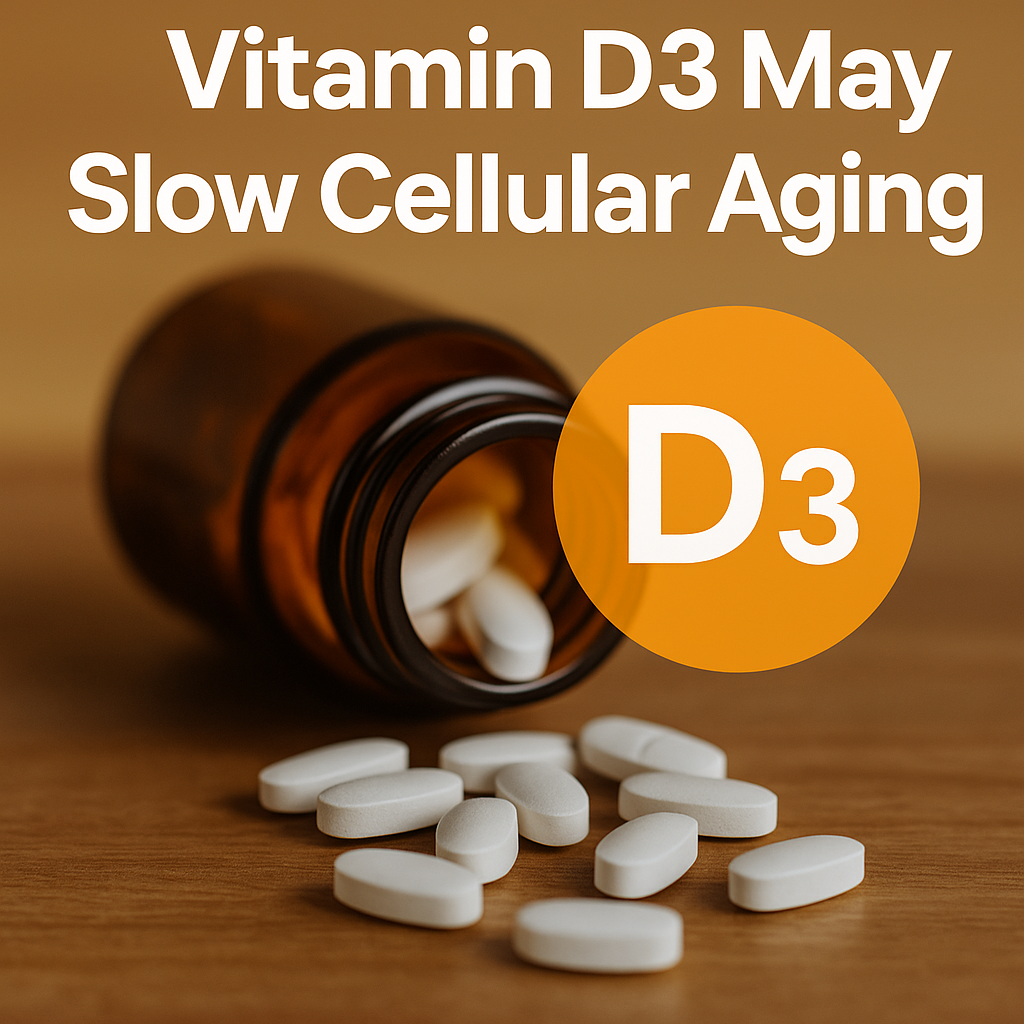You may already associate aging with gray hair, wrinkles, and fatigue — but the real clock is ticking deep inside your cells. A new study published in the American Journal of Clinical Nutrition reveals that vitamin D3 supplementation may help slow that biological clock by preserving telomere length — a key marker of cellular aging.
What Are Telomeres and Why Do They Matter?
Telomeres are protective caps at the ends of chromosomes that safeguard DNA during cell division. Each time a cell replicates, telomeres naturally shorten. When they become too short, the cell can no longer divide effectively — a hallmark of aging and age-related diseases such as:
- Cardiovascular disease
- Diabetes
- Cognitive decline
- Cancer
Slower telomere shortening may mean slower biological aging and reduced disease risk.
Inside the Study: VITAL Trial’s Telomere Sub-Study
The study was part of the renowned VITAL trial, a large, long-term randomized, placebo-controlled U.S. study examining the effects of vitamin D3 (2,000 IU/day) and omega-3 fatty acids on aging and chronic disease.
A subset of 1,054 participants had their telomere lengths measured at baseline, year 2, and year 4. They were assigned to one of four groups:
- Vitamin D3 only
- Omega-3 only
- Both supplements
- Placebo
Key Findings
- Participants who took 2,000 IU of vitamin D3 daily experienced significantly less telomere shortening over four years.
- This protective effect was equivalent to preventing nearly three years’ worth of biological aging.
- Omega-3 supplementation did not show a similar effect on telomere length.
“VITAL is the first large-scale, long-term randomized trial to show that vitamin D protects telomeres,” said study co-author Dr. JoAnn Manson.
These findings complement other VITAL data showing that vitamin D may reduce inflammation and lower risk for advanced cancers and autoimmune diseases.
How Does Vitamin D Work?
Vitamin D plays key roles in:
- Bone health and calcium metabolism
- Immune system modulation
- Reducing systemic inflammation
- Regulating gene expression
Its ability to protect telomeres may stem from its anti-inflammatory and antioxidant actions, as well as its support for mitochondrial and cellular health.
Who Is at Risk of Vitamin D Deficiency?
Vitamin D deficiency is common, especially among people who:
- Live in northern latitudes
- Spend little time outdoors
- Have darker skin (which reduces natural synthesis)
- Use sunscreen consistently
Food sources are limited and include:
- Fatty fish (salmon, sardines, mackerel)
- Fish-liver oils
- Fortified foods (milk, cereals)
- Sun-exposed mushrooms
- Egg yolks and beef liver
Supplementing: How Much and When?
The RDA for vitamin D is:
- 600 IU/day for adults up to age 70
- 800 IU/day for those over 70
However, the VITAL study used 2,000 IU/day, which exceeds current RDA levels but remains within safe daily intake limits for most adults.
“Our findings suggest that targeted vitamin D supplementation may be a promising strategy to counter a biological aging process,” said Dr. Haidong Zhu, co-author.
Should You Take a Vitamin D Supplement?
If you suspect a deficiency or want to explore vitamin D’s role in aging, speak with your healthcare provider. They may recommend:
- Blood tests to measure 25(OH)D levels
- Dosing strategies based on age, sun exposure, and medical history
While more research is needed to generalize these findings across all populations, the evidence continues to build: vitamin D may be more than a bone-strengthening nutrient — it may also be a cellular anti-aging tool.
Bottom Line: A new study from the VITAL trial found that taking 2,000 IU of vitamin D3 daily helped preserve telomere length over four years — potentially delaying cellular aging by nearly three years. As with all supplements, personalization and medical guidance are key.



